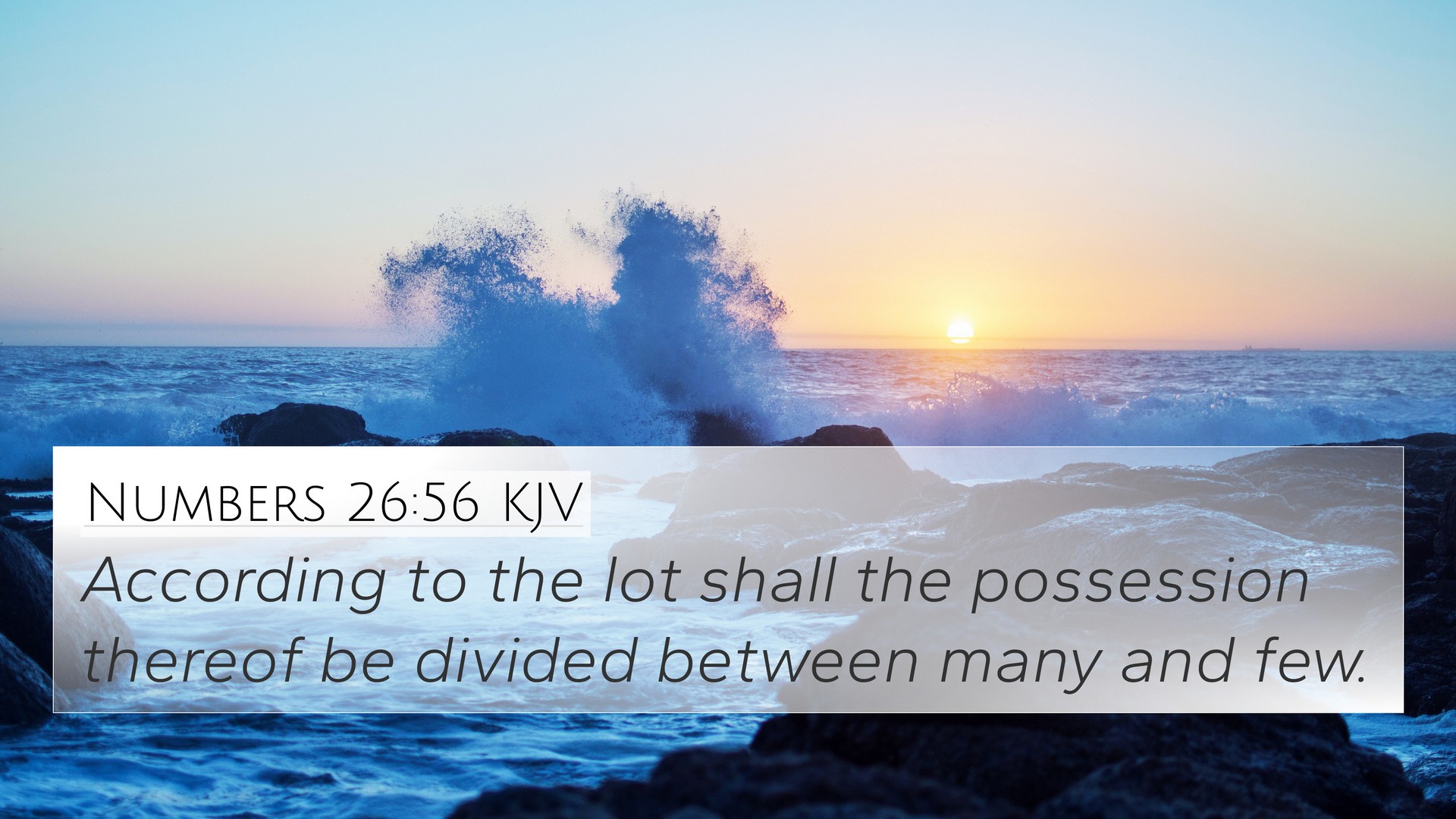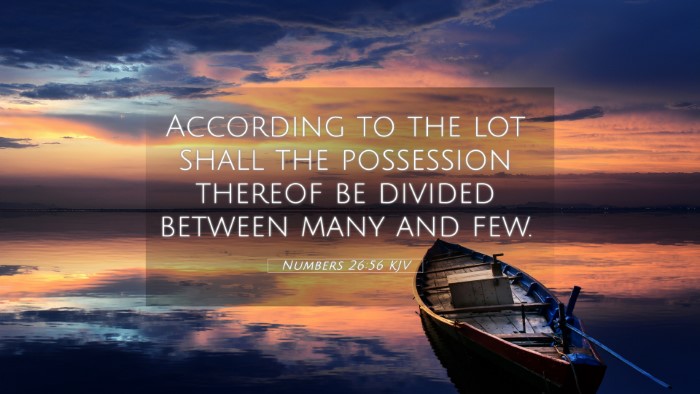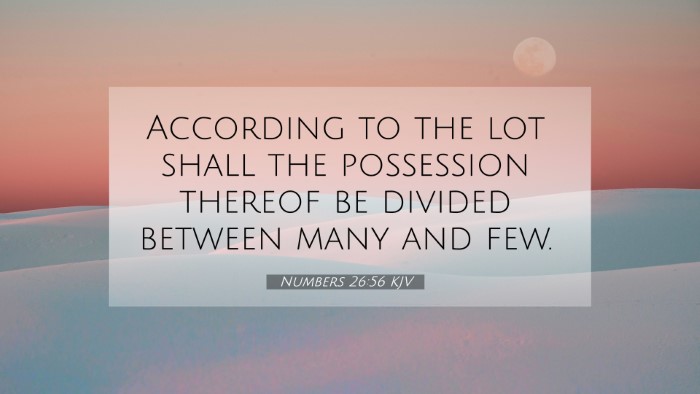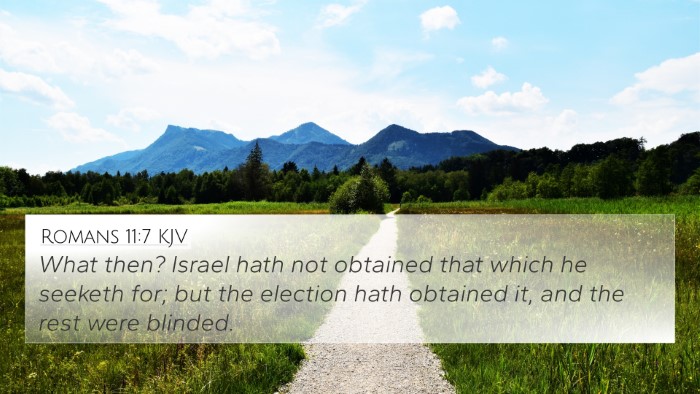Understanding Numbers 26:56
Numbers 26:56 states: "According to the lot shall the possession thereof be divided between many and few." This verse is part of the broader narrative where the Israelites are being prepared for their entrance into the Promised Land, following their forty years in the wilderness. The division of land among the tribes according to the lot signifies a divinely ordained distribution, reflecting God's sovereignty and justice.
Contextual Background
The context of Numbers 26 revolves around the second census of the Israelites. Moses is instructed to take count of each tribe, not only to organize the people for settling in Canaan but also for distributing land among the tribes. The significance of this census and the subsequent land allotment is underscored throughout the book, emphasizing God’s promise and the fulfillment of His covenant.
Commentary Insights
- Matthew Henry: He highlights that the division by lot was not arbitrary but was to ensure that the distribution of land was fair and reflective of God’s will. Henry points out that the lots dictated how much land each tribe would inherit, emphasizing God’s providence over human efforts.
- Albert Barnes: Barnes elaborates on the fairness of this method of land distribution, arguing that it prevents disputes and jealousy among the tribes. Each tribe receiving its portion by lot is a demonstration of God's justice, ensuring each tribe receives according to His plan, not human bias.
- Adam Clarke: Clarke examines the spiritual implications of this verse, stating that the idea of a "lot" symbolizes the divine guidance present in all decisions. He suggests this is a precursor to understanding greater themes of faith and reliance on God’s provision, evident throughout Scripture.
Bible Cross-References
Understanding Numbers 26:56 also requires us to consider several Bible verses that share thematic or contextual connections. Here are some relevant cross-references:
- Joshua 14:2: This verse follows the allotment of land after the conquest of Canaan, demonstrating the fulfillment of the divisions made earlier in Numbers.
- Proverbs 16:33: "The lot is cast into the lap, but its every decision is from the Lord," emphasizes divine control over fate, related to casting lots for land distribution.
- Acts 1:26: The apostles cast lots to choose a replacement for Judas, showing that the practice of casting lots in significant decisions continues into the New Testament, illustrating God’s guidance.
- Psalms 22:18: "They divide my garments among them, and for my clothing they cast lots," showcasing the significance of lots in divinely ordained actions.
- 1 Samuel 14:41: Saul uses lots to discern God’s will, indicating the tradition of seeking divine approval through casting lots.
- Matthew 12:18: This relates the chosen servant of God, reinforcing the providence that Numbers 26:56 articulates.
- Romans 8:28: Illustrates that all things work together for good, similar to the assurance given by God in allotting land to tribes.
Thematic Connections
Numbers 26:56 embodies major themes in the Bible such as:
- God's Sovereignty: The allotment of land by lot signifies God’s ultimate authority in determining the fate and future of His people.
- Divine Justice: The method of division suggests fairness in the eyes of God, eliminating partiality and ensuring that every group is served.
- Community and Unity: By sharing the inheritance among tribes, the Israelites were reminded of their collective identity as God’s covenant people.
- Faith and Providence: The act of casting lots alludes to reliance on God’s wisdom rather than human understanding or desires.
Comparative Bible Verse Analysis
This verse can be explored further through comparative analysis with other Biblical texts, enhancing our understanding of divine guidance and the role of community in spiritual matters.
- Hebrews 11:1: "Now faith is the substance of things hoped for, the evidence of things not seen," connects with the faith required in trusting God's decision in allotting land.
- 2 Corinthians 5:7: "For we walk by faith, not by sight," further reinforces the notion of trusting God’s unseen guiding hand in life decisions.
Conclusion
Numbers 26:56 provides rich insights into the significance of God-led decisions in the life of believers. By examining cross-references and comparing related verses, we can appreciate the harmony and interconnectedness found throughout the Scriptures. This understanding reinforces the belief that God is actively involved in the direction of His people, guiding them to fulfill His purposes as reflected in their communal heritage.




